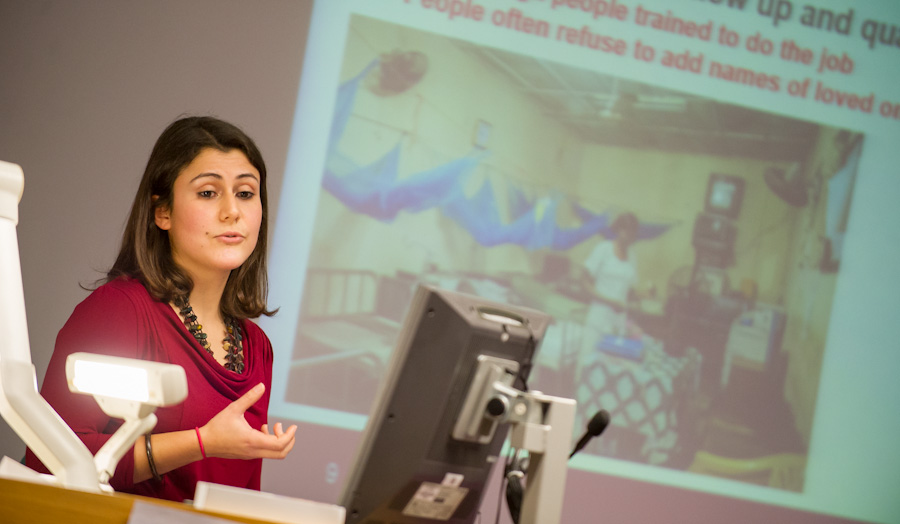Biomedical Science graduate Cristina Leggio discusses her experience working in Sierra Leone during the Ebola outbreak.
Date: 5th March 2015
London Met alumna Cristina Leggio spoke last Friday about her experience working in Sierra Leone.
After completing her BSc Biomedical Science degree at London Met, Cristina began working for Public Health England (PHE) in their Rare and Imported Pathogens Laboratory in Porton Down. Last week she returned to London Met to share her success story and inspire future scientists.
In November 2014 Cristina answered a call for volunteers to be deployed to Sierra Leone as part of the UK response to the current Ebola Outbreak.
Speaking about the decision she said: “Some time ago I chose to be in science because I wanted to do something that could help people and find solutions as part of my daily work.
“For the first time in my career I was in the position to use my skills and experience to provide support to a country struggling.
“It was a call I could not ignore.”
Cristina was part of the team to set up the 3rd PHE Ebola Diagnostic Laboratory in Makeni, Sierra Leone which was built within the Ebola Treatment Centre (ETC) in the Bombali district.
The lab had to be built and stocked from scratch to provide the diagnostic service required to identify and isolate suspected Ebola patients. “Setting up the lab was the first real challenge” Cristina said. “It was very hot and humid, all the equipment was delivered to us in huge crates, some weighing up to 400kg, which had to be shifted around, opened, checked and then moved by hand.
“Despite the blisters and the intense heat team morale was high. We all knew that the quality of our work could have a direct impact on people’s lives and this thought kept us going.”
Cristina’s talk explained the biology of the Ebola Virus Disease, its life cycle, key interventions to contain the outbreak, as well as describing her daily tasks in Sierra Leone. “Whilst in the lab, the main focus was to carry out all the laboratory procedures safely and meticulously” Cristina commented.
“When handling samples of a deadly virus there is no room for error. High containment work can be time consuming and tiring, the samples are handled inside an isolator through three layers of gloves.”
Many things have changed since the outbreak: there are restrictions to population movement, public gatherings have been banned, schools and universities have been closed, international companies have left the country and road blocks and temperature check points are in place across Sierra Leone, Guinea and Liberia.
Earlier this week Cristina returned to Sierra Leone to continue her work there. “Coming back to my daily work has not been easy.” She said, “it was difficult to shake off the thought that there is still a lot of work to be done out there.”

